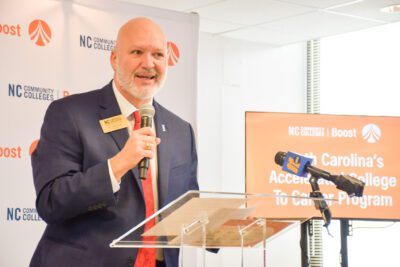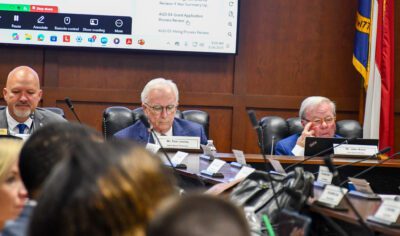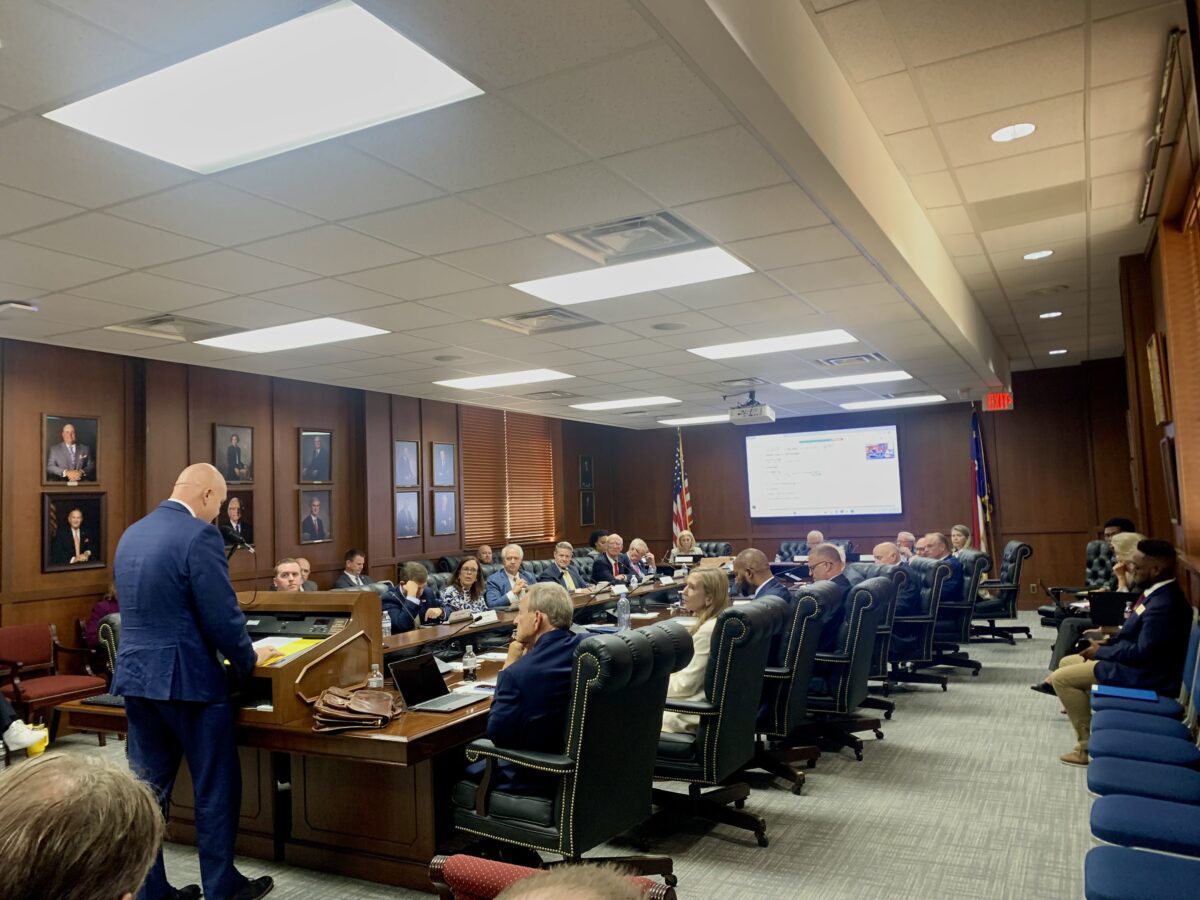
The State Board of Community Colleges reflected at its meeting last week on the work of the previous academic year while looking toward a future without current N.C. Community College System (NCCCS) President Dr. Jeff Cox, who announced his retirement earlier this month, effective June 30, 2026.
During the meeting, Cox addressed the Board publicly for the first time since his announcement. He reflected on his 32 years in education — which includes leading the NCCCS since June 2023, nine years as president of Wilkes Community College, and serving as superintendent of Alleghany County Schools. Regarding his time at the system, Cox highlighted the success of dual enrollment programs, new funding for enrollment growth, and Pell Grant availability for short-term workforce training courses.
“My commitment to you all is we’re going to keep the pedal down to the floor and keep moving this system forward in a positive way,” Cox said.
![]() Sign up for Awake58, our newsletter on all things community college.
Sign up for Awake58, our newsletter on all things community college.
At the time of Cox’s retirement announcement, a system press release said, “The State Board of Community Colleges will outline a formal transition process in the months ahead.”
Board Chair Tom Looney thanked Cox for his service and leadership at the meeting.
“We were in a real period of transition at the community college system at the point you came in. You brought stability, knowledge of rural colleges, a passion for students and the community college system, and a broad experience in education,” he said. “So on behalf of the Board, we want to thank you for your leadership over the past two years, but more importantly, your leadership over the coming months, as we begin down a path of transition. But a heartfelt thanks to everything you’ve brought to this position. This is not goodbye — there is still a lot of work to get done.”
Last week also marked Bladen Community College President Dr. Amanda Lee’s first meeting as president of the North Carolina Association of Community College Presidents.
Earlier this month, Lee said in a statement to EdNC that “Dr. Cox has been a steadfast advocate for student success, workforce development, and educational access throughout his career.”
“His vision, collaborative spirit, and commitment to advancing North Carolina’s community colleges have left a lasting mark on our state,” she said. “…His retirement marks the close of a chapter, but his impact will continue to be felt across our institutions and among the countless students whose lives have been transformed through education.”
During her remarks to the Board last week, Lee spoke about the year ahead, expressing excitement for initiatives like Boost, NC Reconnect, and Skills USA, and for receiving enrollment growth funding from the General Assembly. Lee said that the association’s future goals for the year include advocating for the Propel NC funding model and staff raises.
“We are reaffirming our mission, which is — just like you — to focus on student success, meeting the students where they are, and getting them ready for the workforce and their opportunities that are ahead,” Lee said.
Education records of minor students
A new state law requires all community colleges to have a clearer process for granting parents access to the education records of their minor students.
Parents currently have rights to the information if the student is in high school, but those rights are transferred to the students in postsecondary courses. Under the new law, changes will apply specifically to students who are dependents, not those who are emancipated. A student’s medical information is not included in the policy, as it is covered by HIPAA, the federal law restricting release of medical information.
Last week, the Board discussed and approved a new policy, which would require minor students to complete a consent form “prior to registration in any course.” The Board’s approval of the new rule on Friday began the rulemaking process. Once public comment is complete, the policy will come back to the Board for a final vote.
You can read the full policy here.
Hurricane Helene relief allocations
The Board extended the spending deadline for state relief aid received by the community college system and the 13 community colleges that were impacted by Hurricane Helene.
That initial disaster relief allocation was nearly $1.2 million for Fiscal Year (FY) 2024-25. Institutions now have until June 30, 2027, to use the funding or return it to the system office to be reallocated to another college, according to a Board document.
Here’s a look at the funding that was extended:
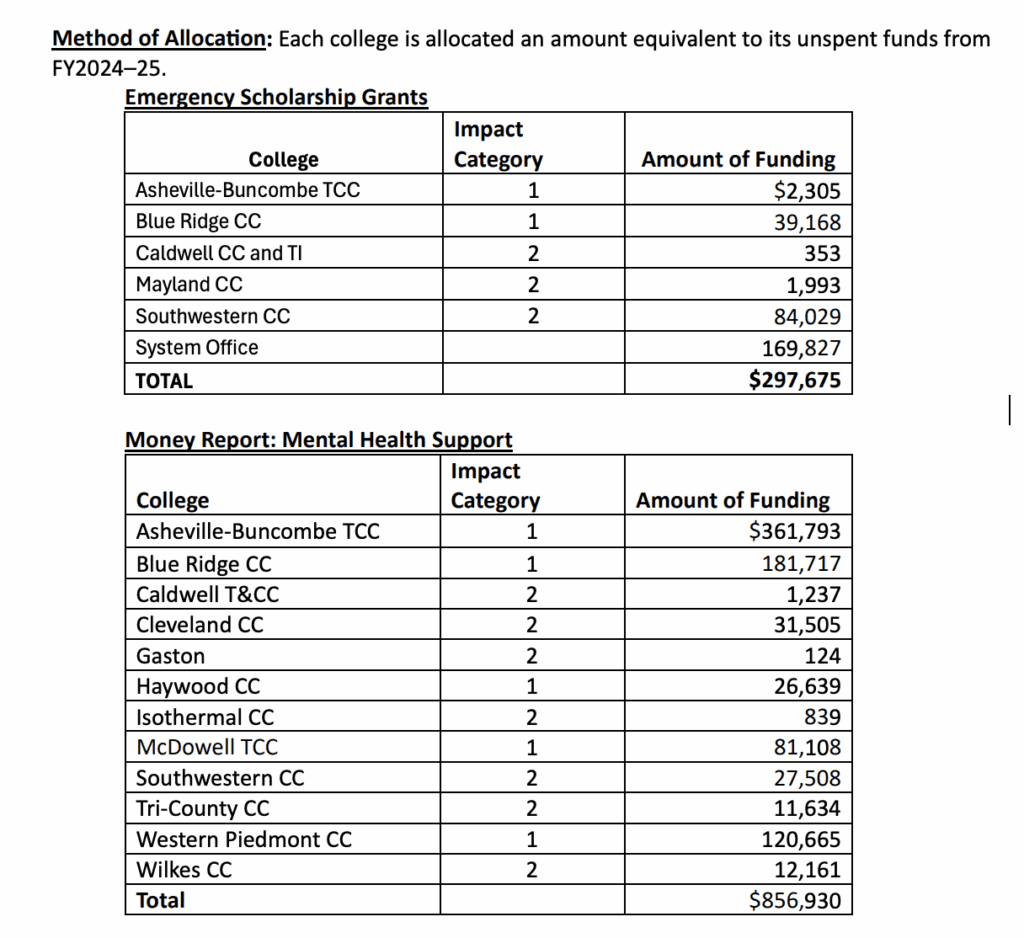
Also on Friday, the Board approved “a reallocation of $1,106,081 to six community colleges designated as most impacted by Hurricane Helene.”
“This reallocation ensures that financial support is directed to the institutions most affected by Hurricane Helene, enabling them to continue providing essential educational services and support to students during recovery,” a Board document says. “The reallocation also aligns with the legislative intent to maximize the impact of available disaster recovery funds.”
These funds can also be used until until June 30, 2027. Here’s a look at the allocations that were approved:
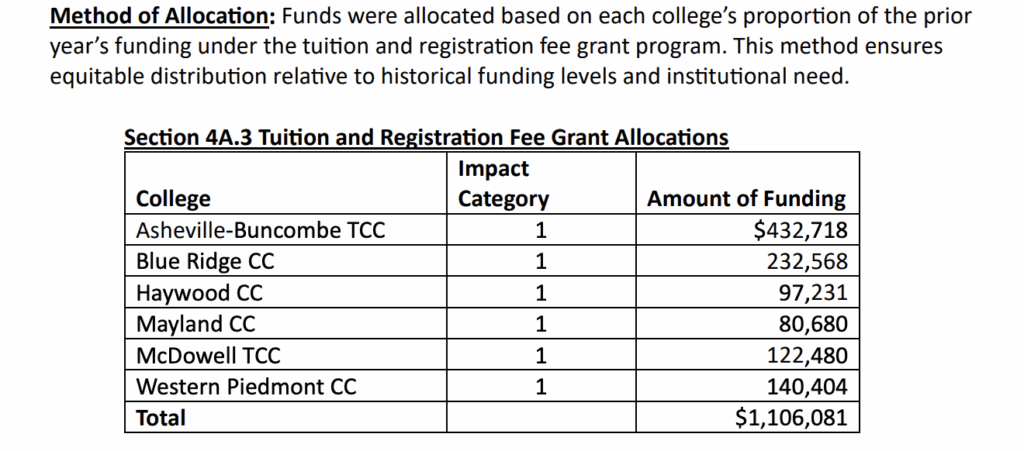
Read more



Title II allocation
The Board also approved allocations of Workforce Innovation and Opportunity Act (WIOA) Title II funds. The funds are divided across three different areas: adult education and literacy, corrections education and other institutionalized individuals, as well as integrated English literacy and civics education.
The North Carolina Office of Adult Education announces a multi-year grants competition to eligible providers as required by WIOA Title II, § 463.20. Grant funds made available under section 222 (a)(1) of the Act, to NCCCS, require a competitive grant process to award funds to eligible providers to enable them to develop, implement, and improve adult education and literacy activities within the State.
NCCCS College & Career Readiness website
All 58 community colleges and eight community-based organizations received funding in this grant cycle, according to Board documents, with no changes to the funding formula.
The total amount allocated for adult education was more than $14.4 million; corrections education was $920,488; and integrated English literacy was nearly $1.4 million. You can view the allocations for individual colleges by clicking on the hyperlink for each grant.
Although the grant is on a four-year cycle, approvals were only made for one year due to federal funding uncertainty, finance committee chair Lisa Estep said.
The approved funding period for each of the allocations is July 1, 2025, through June 30, 2026.
Update on ‘Success without Borders‘ program
In 2023, the state budget directed to Board to create and implement a pilot program to allow Tri-County Community College to offer in-state tuition to up to 100 residents of certain Georgia counties that border North Carolina: Fannin, Rabun, Towns, and Union. The budget said in-state tuition could be offered as long as the out-of-state students do not displace a North Carolina resident eligible for in-state tuition.
Last week, the Board heard a legislative update on the program, which expires at the end of the 2026-27 academic year. Per the report, during the 2024-25 school year, including the summer term, 141 qualifying students were enrolled across 22 academic programs. No North Carolina residents were displaced by the out-of-state students in the pilot program, the report says.
Dr. Roarke Arrowood, associate vice president of teaching and learning at Tri-County Community College, said that many of the students enrolling were studying in high-demand, technical fields.
“And these are all programs that have labor shortages in our region,” Arrowood said. “So it’s great to have students in the pipeline to go into the workforce.”
Board members said that the program has potential to spread to other colleges near the North Carolina border.
“During TCCC’s annual advisory committees, the Building Construction and Electrical Engineering programs both had employers praise the pilot program as it reduces barriers for Georgia students and has grown the enrollment in these programs, adding to the NC workforce,” the report document says. “The pilot program has also helped expand TCCC’s clinical partnerships and will fill critical shortages in fields like nursing, medical sonography, and emergency medical services.”
Debut for a new temporary committee
For the first time, the Board’s transformation committee met this month. The temporary committee’s purpose is to leverage technology to enhance the student experience. Its charter was approved last week, and more details on their work will be launched during the September Board retreat.
According to the charter, the committee’s mission is “to empower community colleges to enhance workflows, foster collaboration and leverage technologies and tools that support improved student success and institutional effectiveness to better meet the evolving needs of North Carolina’s workforce.”
“My whole career has been built on a maniacal focus on customers, and we have to be focused on our students and the student outcomes,” said Scott Ottman, chair of the committee who was sworn in as a Board member in July. “And everything we do in this new committee really should be measured by how it improves the student journey from K-12 to a career, with, again, a maniacal focus on the customer.”
New Mayland CC president, strategic plan update, and more
- The Board approved the next president of Mayland Community College, Dr. Aron Gabriel, current superintendent of Newton-Conover City Schools. In a press release, the college said “Dr. Gabriel has long been an advocate for connecting education to real-world opportunities. In his previous roles, he worked closely with community colleges to increase student access to career pathway programs, college credit opportunities, and workforce credentials.” He will begin as president in January 2026.
- The Board’s strategic planning committee announced that it will provide a full report on the 2022-26 strategic plan’s progress and steps towards drafting the next one during the Board’s retreat next month.
- The Board extended its contract with broadband connectivity provider MCNC for five years “to provide internet access to the System Office, all fifty eight community college main campus’, enhance network security, hosting computer services, (and) video conferencing software.” The contract amount was approved for up to $21.25 million.
- A report on the state’s proprietary schools was released and presented, including information on school openings, closures, student complaints, and more. According to the report, there were 11,536 enrollments in North Carolina proprietary schools during FY 2024-25.
- The Board also heard a presentation on the NC Edge Customized Training program. NC Edge supported 848 NC companies in FY 2024-25, the report said, and delivered training to 30,883 individuals through 319 projects.
The Board will reconvene in Raleigh for its annual retreat on Sept. 17-19.
Recommended reading
